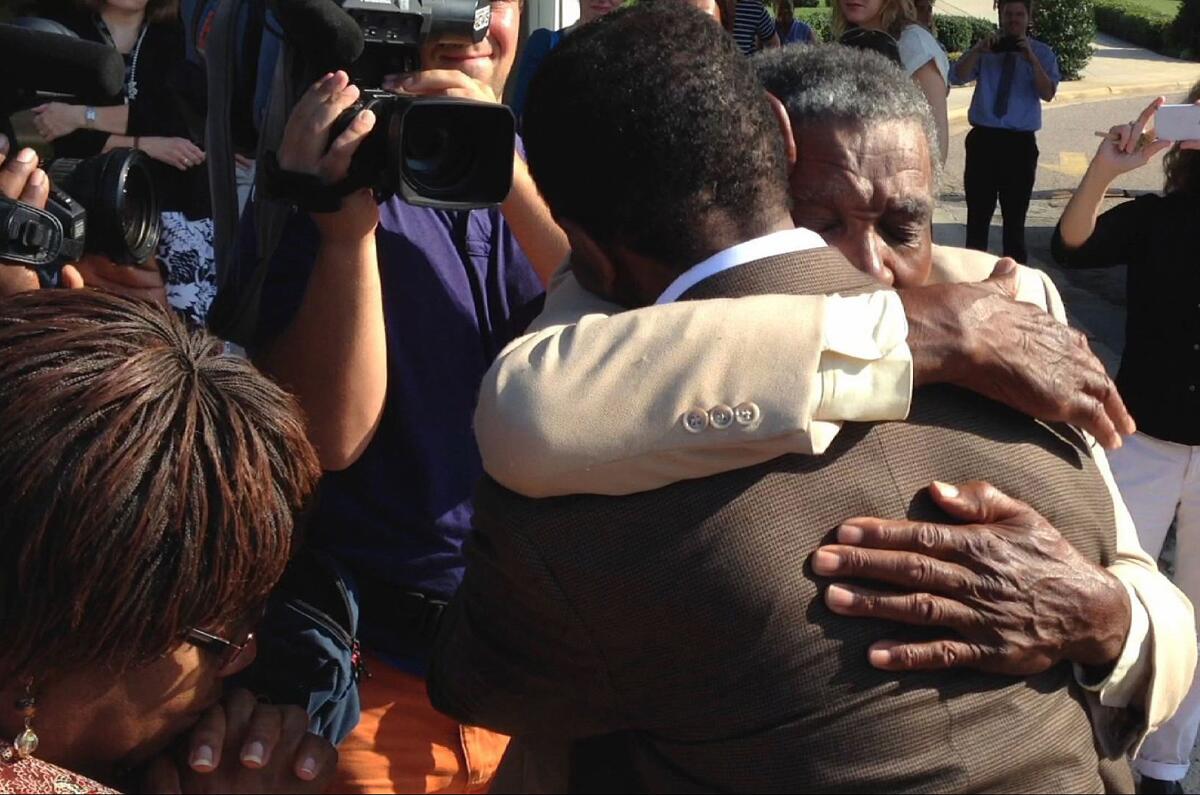Opinion: With a system this screwed up, the death penalty is indefensible

There have been a lot of stunning moments in the trajectory of the case of two mentally disabled half brothers who spent 30 years in North Carolina prisons – one of them on death row – only to be ordered freed this week after DNA evidence cleared them of guilt. One of the more grating aspects, though, has been the response of the original district attorney in the case, who told local reporters last week that he still thinks the two men are guilty of the 1983 rape and murder of an 11-year-old girl.
That reaffirmation comes despite clear evidence that investigators coerced the two men – whose IQ test results had run below 70 – into signing confessions. Despite a lack of physical evidence tying Henry McCollum, then 19, and Leon Brown, then 15, to the scene. Despite an apparent rush to judgment by police, who failed to link the similar rape and murder of another young woman in the area to the death of Sabrina Buie, the 11-year-old victim in the brothers’ case. And despite fresh DNA evidence that tied the man convicted in the second rape-and-murder case, Roscoe Artis, to the scene of the Buie murder.
The retired prosecutor, Joe Freeman Britt, told the News & Observer newspaper last week that he still has no doubts that the confessions were valid and that McCollum and Brown were guilty. From the News & Observer:
“Britt said he doesn’t put much stock in DNA exonerations.
“’You find a cigarette, you say it has Roscoe Artis’ DNA on it, but so what?’ Britt said. ‘It’s just a cigarette, and absent some direct connection to the actual killing, what have you got? Do you have exoneration? I don’t think so.’”
He’s about the only one who doesn’t think so. The current district attorney, Johnson Britt (no relation), told the court Tuesday his office would not seek to re-try McCollum and Brown because the state “does not have a case.” Britt also said “the whole case rests on the confessions,and the DNA evidence threw those confessions under the bus.”
The judge ordered the men freed; McCollum was released from death row Wednesday morning and Brown, serving a life sentence, was expected to be freed later in the day from a separate prison.
At its heart, the case reflects the worst of the criminal justice system: flimsy evidence, brow-beaten mentally disabled suspects initially interviewed based on rumor (a girl told police she had heard that McCollum was among a group of men who attacked Buie), failure by the investigative apparatus to follow up on evidence analysis, failure to turn over exculpatory evidence to the defense, and rank hubris.
Then add in North Carolina’s history of racially skewed justice.
Regular readers of this blog know my opposition to the death penalty, and regular readers of the editorial page know the paper holds a similar view. There are a number of reasons to oppose state executions, but this case exemplifies the most clear-cut: that even when police and prosecutors and judges and juries are dead sure they have the right killer, they still occasionally get it wrong. And in a legal system that is based on argument rather than truth, and where the pressure on police and prosecutors is to get convictions, the opportunity for malfeasance and even benign human error are too high.
Britt’s continued insistence that the convictions should stand is galling, though probably shouldn’t be a surprise coming from a man who took pride in being Guinness Book of Records’ “deadliest prosecutor.” Better to have prosecutors who take pride in finding truth and achieving justice.
And a footnote: Supreme Court Justice Antonin Scalia has doubted whether an innocent man has even been executed in this country (evidence to the contrary), but even if some have, he has no problem with it. “This court has never held that the Constitution forbids the execution of a convicted defendant who has had a full and fair trial but is later able to convince a court that he is ‘actually’ innocent.”
Investigators who coerce confessions, prosecutors who focus on a courtroom victory over the truth, and at least one Supreme Court justice who doesn’t object to executing the innocent as long as the right procedure was followed.
That’s not a capital punishment system. That’s lunacy.
Follow Scott Martelle on Twitter @smartelle.
More to Read
Start your day right
Sign up for Essential California for news, features and recommendations from the L.A. Times and beyond in your inbox six days a week.
You may occasionally receive promotional content from the Los Angeles Times.







